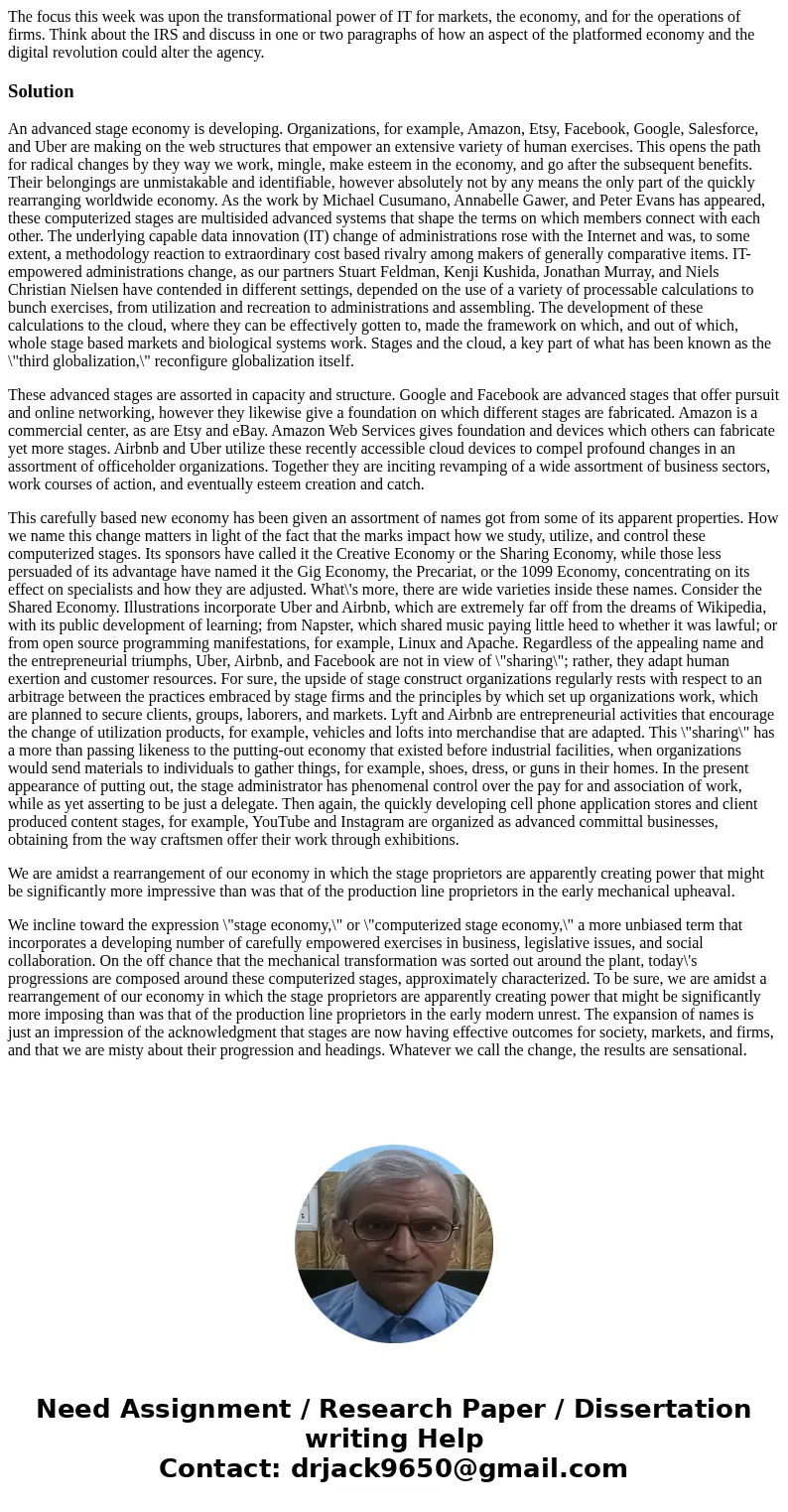The focus this week was upon the transformational power of I
The focus this week was upon the transformational power of IT for markets, the economy, and for the operations of firms. Think about the IRS and discuss in one or two paragraphs of how an aspect of the platformed economy and the digital revolution could alter the agency.
Solution
An advanced stage economy is developing. Organizations, for example, Amazon, Etsy, Facebook, Google, Salesforce, and Uber are making on the web structures that empower an extensive variety of human exercises. This opens the path for radical changes by they way we work, mingle, make esteem in the economy, and go after the subsequent benefits. Their belongings are unmistakable and identifiable, however absolutely not by any means the only part of the quickly rearranging worldwide economy. As the work by Michael Cusumano, Annabelle Gawer, and Peter Evans has appeared, these computerized stages are multisided advanced systems that shape the terms on which members connect with each other. The underlying capable data innovation (IT) change of administrations rose with the Internet and was, to some extent, a methodology reaction to extraordinary cost based rivalry among makers of generally comparative items. IT-empowered administrations change, as our partners Stuart Feldman, Kenji Kushida, Jonathan Murray, and Niels Christian Nielsen have contended in different settings, depended on the use of a variety of processable calculations to bunch exercises, from utilization and recreation to administrations and assembling. The development of these calculations to the cloud, where they can be effectively gotten to, made the framework on which, and out of which, whole stage based markets and biological systems work. Stages and the cloud, a key part of what has been known as the \"third globalization,\" reconfigure globalization itself.
These advanced stages are assorted in capacity and structure. Google and Facebook are advanced stages that offer pursuit and online networking, however they likewise give a foundation on which different stages are fabricated. Amazon is a commercial center, as are Etsy and eBay. Amazon Web Services gives foundation and devices which others can fabricate yet more stages. Airbnb and Uber utilize these recently accessible cloud devices to compel profound changes in an assortment of officeholder organizations. Together they are inciting revamping of a wide assortment of business sectors, work courses of action, and eventually esteem creation and catch.
This carefully based new economy has been given an assortment of names got from some of its apparent properties. How we name this change matters in light of the fact that the marks impact how we study, utilize, and control these computerized stages. Its sponsors have called it the Creative Economy or the Sharing Economy, while those less persuaded of its advantage have named it the Gig Economy, the Precariat, or the 1099 Economy, concentrating on its effect on specialists and how they are adjusted. What\'s more, there are wide varieties inside these names. Consider the Shared Economy. Illustrations incorporate Uber and Airbnb, which are extremely far off from the dreams of Wikipedia, with its public development of learning; from Napster, which shared music paying little heed to whether it was lawful; or from open source programming manifestations, for example, Linux and Apache. Regardless of the appealing name and the entrepreneurial triumphs, Uber, Airbnb, and Facebook are not in view of \"sharing\"; rather, they adapt human exertion and customer resources. For sure, the upside of stage construct organizations regularly rests with respect to an arbitrage between the practices embraced by stage firms and the principles by which set up organizations work, which are planned to secure clients, groups, laborers, and markets. Lyft and Airbnb are entrepreneurial activities that encourage the change of utilization products, for example, vehicles and lofts into merchandise that are adapted. This \"sharing\" has a more than passing likeness to the putting-out economy that existed before industrial facilities, when organizations would send materials to individuals to gather things, for example, shoes, dress, or guns in their homes. In the present appearance of putting out, the stage administrator has phenomenal control over the pay for and association of work, while as yet asserting to be just a delegate. Then again, the quickly developing cell phone application stores and client produced content stages, for example, YouTube and Instagram are organized as advanced committal businesses, obtaining from the way craftsmen offer their work through exhibitions.
We are amidst a rearrangement of our economy in which the stage proprietors are apparently creating power that might be significantly more impressive than was that of the production line proprietors in the early mechanical upheaval.
We incline toward the expression \"stage economy,\" or \"computerized stage economy,\" a more unbiased term that incorporates a developing number of carefully empowered exercises in business, legislative issues, and social collaboration. On the off chance that the mechanical transformation was sorted out around the plant, today\'s progressions are composed around these computerized stages, approximately characterized. To be sure, we are amidst a rearrangement of our economy in which the stage proprietors are apparently creating power that might be significantly more imposing than was that of the production line proprietors in the early modern unrest. The expansion of names is just an impression of the acknowledgment that stages are now having effective outcomes for society, markets, and firms, and that we are misty about their progression and headings. Whatever we call the change, the results are sensational.

 Homework Sourse
Homework Sourse